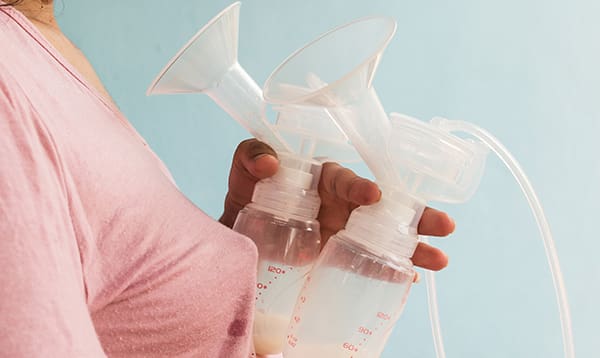By Ali Weatherford
Breast pumps and baby scales are tools that can be very valuable and helpful for some people. Not everyone will need either or both of these tools, but when you do need them, it’s great to have some options and resources so you can make the right choice for you.
Breast Pumps
Most people think about breast pumps when they are pregnant and shopping or making a baby registry. It can be so hard to know what kind to get when you’ve never bought or used one before and when you might not even be sure how you will end up using it!
A breast pump is a tool used to remove milk from the breast. There are two main types:
- Manual
- Electric
Manual Pumps
Manual pumps work really well for some people, and they never need anything else. For some people, a good manual pump may even work better than an electric pump. They are inexpensive, small, and simple to use. If you are planning to breastfeed your baby and you’ll only need to make an occasional bottle for shorter separations from your baby, this is probably a great option for you.
If you know you’ll be going back to work full time and/or won’t be able to breastfeed your baby for extended periods of the day, a manual pump might not be the right tool for you. In this situation, a breast pump serves two main purposes:
- To make enough bottles of milk so someone else can feed your baby while you’re away.
- To help you maintain a good milk supply even though you are separated from your baby for extended periods. If your breasts are not stimulated by a baby or a pump at regular intervals, your body will stop making milk because it thinks milk is no longer needed.
Electric Pumps
An electric pump is most likely a better option if you’re going to be doing a lot of pumping. There are many different kinds of electric pump to choose from, and the options will probably seem overwhelming when you start looking.
How to Order a Breast Pump Through Insurance
The first thing to do is contact your insurance company about whether you can get a pump for free. Most insurance companies do provide coverage for breast pumps.
The next thing to do is seek help from a service that will manage this for you. Durable Medical Equipment (DME) supply companies, like the ones listed below, are in-network providers so it’s important to contact your insurance company or the DMEs to find out which are in network with YOUR particular plan. They take your information and then take on the task of getting you the best pump that your insurance will cover. A lot of people do this for themselves through their insurance companies, but it can be a lot trickier than it seems. These DME companies will advocate to make sure you get your pump before your baby arrives, and that you get the pump you want.
Often, insurance companies will only cover the purchase of a few select pumps. They may not offer the option of allowing you to get a different pump and/or pay the difference for a more expensive one. Sometimes they insist on waiting until your baby is born before sending your pump. There is also the step of having a care provider confirm that you’re pregnant and a due date to prove that you should get a breast pump. The DME companies stay on top of everything, and they can make it a very simple, hands-off process for you. AND it doesn’t cost you anything!
These are some examples of DME supply companies that may be in network with your insurance provider.
You may be offered many choices once you do figure out how to get an insurance covered pump. Depending on your particular situation and needs, some or all of them may be good options for you. You can order your pump based on what you expect to need later on, and it will most likely work for you.
Hospital grade: These pumps are not usually needed. If you have a special circumstance that comes up after birth, hospitals provide high-powered pumps for your use while you’re there. If you meet with a lactation consultant and are told that you’ll need a hospital grade pump for home, these can usually be rented temporarily. Most of the time, you would only need one of these for a short period of time and can then continue with your own pump. Breastfeeding Success offers pump rentals in our local areas of Austin and Waco, TX. You can most likely find a similar option near you.
Single electric: This kind of pump is usually smaller, more affordable. and can be used to pump milk from one breast at a time. This is a good option if you’re not in a hurry, or if you plan to breastfeed your baby on one side while pumping on the other. That can be an effective option for making pumping very productive.
Double electric: These pumps can remove milk from both breasts at the same time. They tend to be larger, housing two motors, one for each side. A lot of people choose these pumps for efficiency and convenience. Especially if you are pumping at work, you probably want to be able to complete your pumping in as little time as possible and these pumps allow you to fill two bottles at once.
Battery-powered: Depending on your pumping needs, these can be very convenient. If you do a lot of pumping on-the-go, it might be difficult sometimes to find a place to plug-in while pumping. These offer you the option of pumping wherever you are, even if you don’t have a power outlet nearby. They tend to be a little heavier, and sometimes have lower suction strength so pumping may take a little longer. These usually also offer the option of being able to plug into a wall outlet to pump in case you run out of battery power. They are often more expensive.
Hands-free or wearable: These pumps are battery-powered so that you can actually get up and move around while pumping. They are more compact and contain all the components, including the flange, collection cup, and motor which fit inside the small unit. It can be tucked inside a bra so you can pump very discreetly. They are very light and portable. The downside is that they tend to be more expensive, often not covered by insurance, and are generally not as powerful.
Scales
Baby scales are not something we usually think about when making a registry list. Most people will not need or want to have one, but there are some situations where a scale can give you peace of mind.
When my first baby was born, she was very sleepy and did not like to wake up for very long…..even to eat. I worried so much because she was not on the typical feeding and sleeping schedule for a baby of her age. She would sleep for 5-7 hours and then eat for five minutes before going right back to sleep!
I was given lots of different advice. I had my care provider telling me that I needed to do whatever it takes to wake her up to eat every 2-3 hours. That didn’t work. It made her very mad to be woken up, and she wouldn’t eat anyway. I was told that if she wouldn’t wake to eat more often, I needed to pump or get formula and feed her using a syringe.
That was so disappointing for me. I wanted to be able to breastfeed exclusively, but I also had the feeling that maybe my baby was OK just the way she was. I finally had a lactation consultant tell me it might be just fine. She suggested I pay close attention to her diaper output and her weight for a little while. As long as she was making enough dirty and wet diapers and was gaining some weight, it was probably fine.
I did this for a couple of weeks before I finally felt confident that her weight gain was significant and that her feeding schedule was working. But that meant taking her for weight checks often! I would drive to a place that had a baby scale to weigh her. That’s what helped me keep going with our plan. If I hadn’t been able to reassure myself like this, I may have decided to supplement, and that can sometimes complicate the goal of exclusive breastfeeding. We ended up having a FABULOUS breastfeeding journey after that. It got so much easier until breastfeeding was just the most simple and pleasant thing, and then we continued until she was two years old.
I do wish now that I had known about purchasing or renting baby scales. It would have saved me a lot of driving. You might have places you can go to weigh your baby for free that are close and convenient. For example, Breastfeeding Success outpatient clinics are a great place to weigh your baby if you’re close by. But not everyone lives close to these kinds of resources. You might not like the hassle of having to take your baby out every time you need to get a weight measurement.
In that case, purchasing or renting a baby scale might make a lot of sense for you. You can get a decent baby scale for as little as $50, and that may be all you need if you’re just wanting to check for some weight gain. It’s a good idea to use the same scale each time you weigh your baby since there can be some variation with scales.
There is another reason you might be wanting to weigh your baby though. You might like to have a baby scale at home, but you need a more precise scale. It’s very hard to tell how much milk a baby is getting from a breast. Some people like or need to be reassured about exactly how much milk their baby is getting, especially if your baby was born prematurely or has had a lot of issues with weight gain.
You can schedule a lactation appointment to do a weighted feed, but you can also rent a hospital-grade scale that can give you a very precise measurement. You weigh your baby in a clean diaper before you breastfeed, and then weigh your baby again after the feeding. These very precise instruments can actually measure the amount of milk your baby takes in during a feeding. Breastfeeding Success also offers hospital-grade scale rentals in our area.

